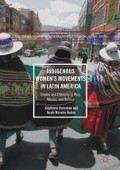Abstract
In this chapter, the formation of different types of women’s organizations is described to trace their trajectories in relation to different sectors of the indigenous movement. The growth of “gender parallelism”, that is, women’s organizations related to male-dominated indigenous organizations, is particularly visible in the Bolivian experience. It shows how indigenous women understand their role as acting side by side their male companions in the struggles of their communities. It also reveals how they have managed to become central actors in the indigenous movement, particularly around the election of Evo Morales as president of Bolivia and afterward. The strength of indigenous women’s voices in politics allowed them to redefine the terms of how Bolivian women are represented nationally.
Si la Descolonización es la revolución india, la Despatriarcalización es la revolución de la mujer indígena, es decir es la revolución dentro de la revolución.
Web page, Vice-Ministerio de Descolonización, Ministerio de Culturas y Turismo, Bolivia
Access this chapter
Tax calculation will be finalised at checkout
Purchases are for personal use only
References
Arnold, D. Y., University of St. Andrews, Dept. of Social Anthropology; University of St. Andrews, Institute of Amerindian Studies. (1997). Parentesco y género en los Andes. La Paz: CIASE/ILCA.
Arnold, D. Y., & Spedding, A. (2005). Mujeres en los movimientos sociales en Bolivia 2000-2003. La Paz: CIDEM/ILCA.
Barrios de Chungara, D., & Viezzer, M. (1978). Let me speak!: Testimony of Domitila, a woman of the Bolivian mines. New York: Monthly Review Press.
Blaser, M., Feit, H. A., & McRae, G. (2004). In the way of development: Indigenous peoples, life projects, and globalization. New York: Zed Books.
Buice, M. C. (2013). Indigenous women, the state, and policy change: Evidence from Bolivia, 1994-2012. PhD, Political Science, University of Tennessee, Knoxville.
CONAMAQ-Cochabamba. (2012). Reconstitución del Ayllu, Marka y Suyu. CONAMAQ-Cochabamba (Ed.), Cochabamba.
Deere, C. D., & León de Leal, M. (2001). Empowering women: Land and property rights in Latin America. Pittsburgh, PA: University of Pittsburgh Press.
Htun, M., & Ossa, J. P. (2013). Political inclusion of marginalized groups: Indigenous reservations and gender parity in Bolivia. Politics, Groups, and Identities, 1(1), 4–25.
Lavaud, J.-P. (1999). La dictature empêchée: La grève de la faim des femmes de mineurs, Bolivie, 1977–1978. Paris: CNRS.
Leon, R. (1990). Bartolina Sisa: The peasant women’s organization in Bolivia. In E. Jelin (Ed.), Women and social change in Latin America (pp. 135–150). London: Zed Books.
Monasterios, K., Stefanoni, P., & do Alto, H. (2007). Reinventando la nación en Bolivia: movimientos sociales, estado y poscolonialidad. La Paz: CLACSO/Plural.
Nash, J. C. (1993). We eat the mines and the mines eat us: Dependency and exploitation in Bolivian tin mines. New York: Columbia University Press.
Rousseau, S. (2010). Populism from above, populism from below: A comparison of Alberto Fujimori’s and Evo Morales’ gender politics. In K. Kampwirth (Ed.), Gender and populism in Latin America: Passionate politics (pp. 140–161). University Park, PA: Pennsylvania State University Press.
Rousseau, S. (2011). Indigenous and feminist movements at the constituent assembly in Bolivia: Locating the representation of indigenous women. Latin American Research Review, 46(2), 5–28.
Rousseau, S. (2014). La construcción de lo indígena en Bolivia: conflictos y luchas entre organizaciones de mujeres en el escenario post constituyente. In N. Henriquez (Ed.), Conflicto social en los Andes. Protestas en el Perú y Bolivia (pp. 331–351). Lima: Fondo editorial PUCP.
Salazar, C. (1998). Movimiento de mujeres en Bolivia: la federación de mujeres campesinas “Bartolina Sisa” y los clubes y centros de madres. La Paz: Servicio Holandés de Cooperación al Desarrollo.
Author information
Authors and Affiliations
Copyright information
© 2017 The Author(s)
About this chapter
Cite this chapter
Rousseau, S., Hudon, A.M. (2017). Indigenous Women Transform the Politics of Representing Women. In: Indigenous Women’s Movements in Latin America. Crossing Boundaries of Gender and Politics in the Global South. Palgrave Macmillan, New York. https://doi.org/10.1057/978-1-349-95063-8_3
Download citation
DOI: https://doi.org/10.1057/978-1-349-95063-8_3
Published:
Publisher Name: Palgrave Macmillan, New York
Print ISBN: 978-1-349-95062-1
Online ISBN: 978-1-349-95063-8
eBook Packages: Political Science and International StudiesPolitical Science and International Studies (R0)

